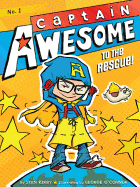It's not every day that a Pulitzer Prize-winning author drops by a regional independent booksellers association meeting to present his latest work, but that's what happened this weekend when Michael Chabon addressed the 120 attendees of the Northern California Independent Booksellers Association spring program.
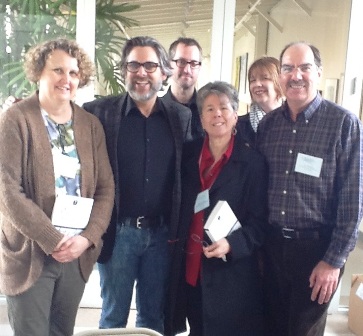 |
| At NCIBA: (l-r.) Ann Seaton, Hicklebee's; Michael Chabon; Jeff Battis, City Lights; Sheryl Colteur, Book Passage; Sandy Mullin, Chestnut Street Books; Jim Hanky, HarperCollins. |
"It seems almost superfluous to do this," said NCIBA president Michael Barnard, as he introduced Chabon, who has been a long-time supporter of Bay Area indies, having graced the thresholds of many member stores over the years. Chabon's fall book, Telegraph Avenue (HarperCollins), is named for one of the main thoroughfares where Oakland and Berkeley unite and collide.
Barnard said that reading Telegraph Avenue is not only about finding a book that "hits you where you live" and "holds up a mirror to your own life." But in Chabon's hands, said Barnard, that mirror is held up with "compassion and generosity."
Clearly recognizing many faces in the room, Chabon said: "It means a lot to me to be standing here before you all."
Between books being published, he explained, writers forget that when a book comes out they will be called upon to account for its existence. "Every time I feel it is incumbent upon me to craft a legend," he said. "The honest and true answer is brief and tedious," he added. "I just thought of it and then I wrote it."
Telegraph Avenue first began as a pilot episode Chabon wrote for TNT in 1999. "This was back before it was sleek and cool for writers to do TV series," he added.
The motivation for the story dates back to the O.J. Simpson murder trial, when Chabon was living in Los Angeles and was unprepared for how the African American community celebrated the innocent verdict. "I felt a sense of loss of connection." Especially, he said, having grown up in Columbia, Md., a community conceived and engineered to be racially, religiously and economically integrated. "My world was filled with black people growing up. Black History Month was my history month, with my heroes and my ancestors," he said. But living in L.A. during O.J., Chabon realized he did not know any black people. "My 12-year-old self would have been disgusted with my 32-year-old self."
Later Chabon moved with his wife, Ayelet Waldman, to Berkeley, just across the Oakland border, where he found a jazz record store in which races and ages mixed over music and a counter up front. "This place was like a bar that didn't sell drinks," he said.
Also, in 1999-2000 he and Waldman (who would both become bestselling authors) were "deep in the midst of a child-producing enterprise" that eventually "topped out at four." That experience made Chabon an odd expert of all things birthing and midwifery, so rather than place his new story solely in the largely male world of jazz, he decided to have one of the owner's partners be part of midwife practice. While he is not quite sure what happened, Chabon said, TNT dropped the idea even before he got them his 90-page, 90-minute pilot script. But the characters stayed with Chabon and he thought it would take 20 minutes to "novelitize" the story. "Four years and nine months later...."
Telegraph Avenue is not a novelized version of the never-made TV pilot; in fact, the author said, the only plot line that remained the same is a birth that goes very badly.
"I find myself at the end of it with the same frame of mind that I had begun with: longing for a place to go that would not make me feel like a failure in the face of that 12-year-old boy." That place, he told the booksellers, "exists only between the covers of a book in mind, and ultimately for readers in the time they are reading it."
HarperCollins printed a special galley for the NCIBA event, because Telegraph Avenue comes out in September. Chabon hung around to sign galleys and catch up with old bookseller pals and meet new ones, before the education sessions continued.
Later this week please look for a report on the other parts of NCIBA's Spring Gathering and Author Reception. --Bridget Kinsella
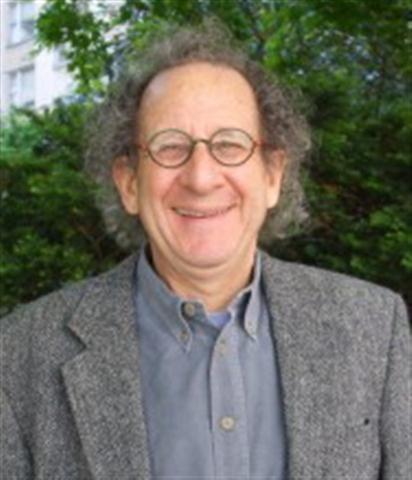 "And what [Peter Hildick-Smith of the Codex Group] sees and documents is the critical role bookstores play in consumer discovery of new books and authors. He demonstrates with data and logic that SEO and social media are totally inadequate substitutes. Hildick-Smith thinks a future without bookstores will be very different than the present. He makes the case that author brands established in the bookstore era will be largely unchallenged when the bookstore ladder gets pulled up and future authors can't climb it. And he believes that publishers don't appreciate that all measures, even desperate measures, are called for to preserve the brick store base as long as possible."
"And what [Peter Hildick-Smith of the Codex Group] sees and documents is the critical role bookstores play in consumer discovery of new books and authors. He demonstrates with data and logic that SEO and social media are totally inadequate substitutes. Hildick-Smith thinks a future without bookstores will be very different than the present. He makes the case that author brands established in the bookstore era will be largely unchallenged when the bookstore ladder gets pulled up and future authors can't climb it. And he believes that publishers don't appreciate that all measures, even desperate measures, are called for to preserve the brick store base as long as possible."


SHELFAWARENESS.1222.S1.BESTADSWEBINAR.gif)


SHELFAWARENESS.1222.T1.BESTADSWEBINAR.gif)
 A limited number of
A limited number of  "Maybe Lord Voldemort put a spell on Amazon.Com Inc on Tuesday," Reuters suggested in reporting on the mysterious case of
"Maybe Lord Voldemort put a spell on Amazon.Com Inc on Tuesday," Reuters suggested in reporting on the mysterious case of  Amazon plans to open a
Amazon plans to open a  "I don't think people understand what exactly is in play. People support libraries, but sometimes don't understand that it takes people to make them run. Just as it takes writers to write new books," author Margaret Atwood told the Toronto Globe and Mail in an e-mail
"I don't think people understand what exactly is in play. People support libraries, but sometimes don't understand that it takes people to make them run. Just as it takes writers to write new books," author Margaret Atwood told the Toronto Globe and Mail in an e-mail 
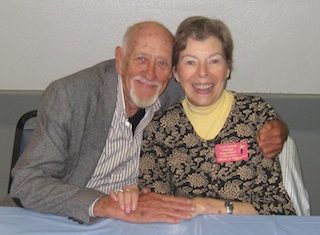
 The trusty guides at
The trusty guides at  Steven John spent five years working in Hollywood at a top talent agency before he decided to become a full-time novelist. Born in Alexandria, Va, he now lives outside of Los Angeles with his wife. His first novel, Three A.M., was just published by Tor (March 27, 2012).
Steven John spent five years working in Hollywood at a top talent agency before he decided to become a full-time novelist. Born in Alexandria, Va, he now lives outside of Los Angeles with his wife. His first novel, Three A.M., was just published by Tor (March 27, 2012).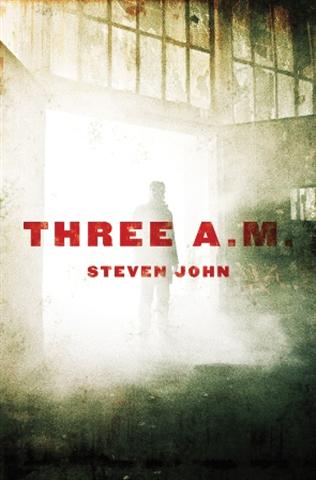 Book you've faked reading:
Book you've faked reading: 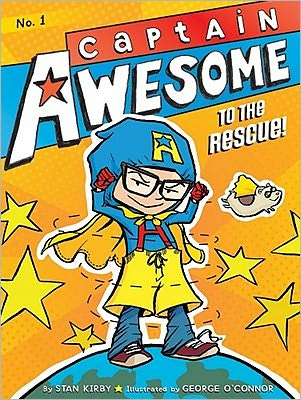 This action-packed launch title in a superhero series will make fluent readers of those just embarking on the world of books. With a hybrid combination of comic book–style illustrations and a chapter book format, Captain Awesome is sure to attract a following of fans.
This action-packed launch title in a superhero series will make fluent readers of those just embarking on the world of books. With a hybrid combination of comic book–style illustrations and a chapter book format, Captain Awesome is sure to attract a following of fans.